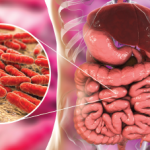“We currently think about RA as an autoimmune joint disease rather than a disease that also involves immune responses to commensal organisms in mucosal sites, including those in the gut or mouth,” Dr. Pianta says. “Proof of concept opens new possibilities for treatment. For example, targeted antibiotic regimens, probiotics or diet alterations may come to have an adjunctive role in treatment of RA, in addition to DMARD therapy. However, further study will be required before such interventions can be recommended.”
The next step in research, according to Dr. Pianta, is gaining a better understanding of the nature of gut dysbiosis and how it is linked to joint pathology. “For example, it will be important to determine whether molecular mimicry between microbial and host T cell epitopes may link mucosal and joint immune responses,” she says.
Kathy Holliman, MEd, has been a medical writer and editor since 1997.
References
- Pianta A, Arvikar S, Strle K, et al. Evidence of the immune relevance of Prevotella copri, a gut microbe in patients with rheumatoid arthritis. Arthritis Rheumatol. 2017 May;69(5):964–975.
- Scher JU, Sczesnak A, Longman RS, et al. Expansion of intestinal Prevotella copri correlates with enhanced susceptibility to arthritis. Elife. 2013 Nov 5;2:e01202.

